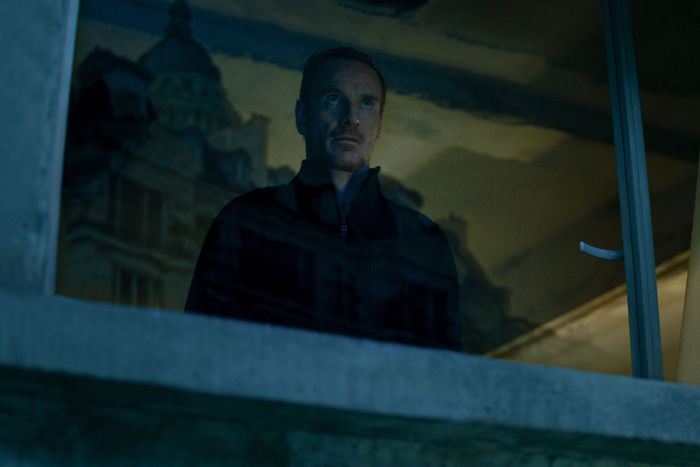
Everyones heard of Chekhovs gun, the firearm you see in the first act and just know will go off by the third. But is there a term for the gun you expect to be fired at the end but isnt? The Killer has one of those. After two hours of methodical bloodshed, the title character of David Finchers sleek Netflix noir finally tracks down his target, gets him in his crosshairs and opts not to pull the trigger. It would be unusual to expect an action-packed finale from a thriller as minimalist as this one. But to deny Michael Fassbenders nameless assassin (and the audience) his final kill? Its an ending as perversely anti-climactic as it is surprising. Its also a pointed subversion, a curveball with a purpose.
The Killer is structured almost like a video game. (From the font choices on down, itÔÇÖs a more faithful Hitman adaptation than the two movies actually based on IOÔÇÖs bestselling sneak-and-execute franchise.) After missing a kill shot in Paris, The Killer narrowly avoids the ensuing blowback. He spends most of the movie hopping the globe, picking off those who treated him as a loose end to be tied up ÔÇö first his handler (Charles Parnell), then the two fellow assassins (Sala Baker and Tilda Swinton) who brutalized his girlfriend while trying to get to him. Throughout, the Killer swears through voice-over that none of this is personal, that itÔÇÖs all just business, even as he pursues what looks an awful lot like revenge.
Everything leads to the supposedly secure Chicago penthouse of Claybourne (Arliss Howard), a billionaire venture capitalist ÔÇö and, as it turns out, the client who both hired the Killer and paid extra to have him rubbed out after he botched the job. Claybourne is no diabolical kingpin. He has not been hiding from the Killer or even expecting him. In fact, he has no clue why a stranger with a silenced pistol has infiltrated his sanctuary. This is a man so sheltered and disassociated from the dirty wetwork heÔÇÖs paid for that heÔÇÖs completely forgotten about it. It really is all business to him, and not the high-end kind; heÔÇÖs as initially foggy on the details as a regular person trying to recall the last Uber they booked or their most recent Doordash order.
Part of the stealth dark comedy of The Killer lies in the way it positions its main characterÔÇÖs cool, stylish professionalism against a backdrop of branded commercial spaces and corporate business. He rents his makeshift crowÔÇÖs nest from WeWork, plots his getaways with Hertz, finds criminal applications for Amazon and FedEX and Postmates. But the Killer isnÔÇÖt just exploiting convenience culture. HeÔÇÖs another part of it: a hitman on demand, as available for the right price as the McDonaldÔÇÖs he dispassionately scarfs down during stakeouts. He is a freelance killer, literally disposable labor. Like most contract workers, he has no protections. And to men like Claybourne, he might as well be an icon on a phone app, securable at a press or swipe.
So when the Killer shows up in that swanky highrise condo, gun fixed on the baron who casually signed off on his murder, it seems possible that the movie might end on a note of symbolic class warfare. Will this contractor strike a blow against the fat cat who devalues him and his dark labor? At a moment when many industries are looking to unionize and the rights of freelance and contract workers are under ballot reform, putting a bullet between the eyes of a hedge-fund Jeff Bezos would get plenty of Netflix subscribers reaching for the ÔÇ£Love this!ÔÇØ two-thumbs-up button.
But Fincher is rarely so sentimental. He would rather stylishly dampen spirits than raise them. Having killed bystanders and fellow hired guns alike ÔÇö no innocent cabbie or secretary earns his mercy ÔÇö FassbenderÔÇÖs assassin finally faces the man who nearly had him snuffed and lets him off with a warning. But why? ItÔÇÖs not the belated stirring of a conscience, thatÔÇÖs for sure. The Killer, in the end, is no revolutionary. He has accepted his station in the gig economy. He canÔÇÖt kill Claybourne because that would violate the power structure to which heÔÇÖs committed his efforts, his talents, maybe his soul. And in a way, he seems to respect how the client has reduced the whole situation to a bad business decision; it reaffirms his own purely financial priorities, maybe purging any personal resentments he had about a deal gone wrong.
ThatÔÇÖs what makes the ending such a bold downer. It doesnÔÇÖt just break with viewer expectations of how a cool hitman-on-a-mission story should come to a close. It avoids any sense of catharsis. There is no moral reckoning for the Killer, and no consequences for the Client. Nothing has been accomplished except the preservation of a grim status quo, and maybe a ceasefire of mutually transactional convenience. Despite the sunny epilogue, a glimpse of luxury lounging in paradise, the upshot of The Killer is about as despairing as SevenÔÇÖs final moments. Guess which sin wins out this time.
More From This Series
- The Ending of Alien: Romulus Is an Abomination By Design
- ItÔÇÖs Thumbs-down for the Forgettable Ending of Gladiator II
- WickedÔÇÖs Cliffhanger Ending, Explained (and What to Expect in Part Two)

